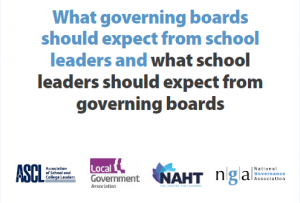
The National Governance Association (NGA), the Association of School and College Leaders (ASCL), the National Association of Head Teachers (NAHT) and the Local Government Association (LGA) have collaborated to produce a new edition of the popular guidance document: ‘What Governing Boards Should Expect from School Leaders and What School Leaders Should Expect From Governing Boards’.
Effective working between those leading and those governing schools is vital to improving education for children and young people. This joint guidance aims to improve the effectiveness of governance by developing effective, mutually supportive and respectful working practices.
Among the expectations this document makes clear are that while governors must have the confidence to have courageous conversations, in turn, school leaders must be willing to be challenged. And while governors must be knowledgeable about the school, including its pupils, staff and community, in turn, school leaders must provide information to them in the appropriate way.
The paper has been broken down into four key areas: the respective roles of governance and management, developing and supporting the governing board, effective ways of working, and understanding the organisation and engaging with stakeholders.
The new edition has been updated to reflect the growing number of schools that are governed as part of multi-academy trusts as well as to emphasise the importance of diversity on the governing board.
Emma Knights, Chief Executive of the NGA, said: “In any sector where an organisation fails there has been a failure of governance. In order to prevent any school from failing its pupils, we need to ensure that governance is strong. This document, now in its fourth edition, is the most important resource we have on the topic of roles and responsibilities.
“It’s essential to ensure that the relationship between governing boards and school leaders is dynamic and productive, allowing everyone to direct their efforts towards the improvement of education and the sustainability of the organisation”.
Russell Hobby, General Secretary of school leaders’ union NAHT, said: “Our schools depend heavily on the volunteer army of people who choose to become school governors. The work they do is vital to a school’s effectiveness and to pupils’ success. Successful schools need highly effective governing bodies with a positive and proactive attitude to school improvement and the right mix of people round the table. This guide gives everyone involved a clear understanding of their roles and responsibilities including how to strike the right balance between strategic and the operational decisions. The guide also includes the best ways to make sure that the relationship between head teachers and their governing boards is conducted in the right spirit and the most professional way, for the benefit of pupils.”
Geoff Barton, General Secretary of the Association of School and College Leaders, said: “there has never been a greater need for effective governance at a time when there is so much change in the education system. This is why the two headteacher associations, the NGA and the LGA have got together to define the way in which this relationship works best in 2017.”
Cllr Richard Watts, Chair of the LGA Children and Young People Board, said: “Councils are ambitious to improve the life chances of all the children and young people in their communities and understand the key role that strong school leadership plays in improving their outcomes. What we expect is an invaluable tool for governors and senior school leaders which sets out best practice in building productive relationships to promote school improvement. I would recommend all schools to use it as a reference guide and support to building and sustaining effective school leadership.”
This guidance is available to both NGA members and non-members. Download as a pdf: What Governing Boards Should Expect From School Leaders and What School Leaders Should Expect From Governing Boards.
